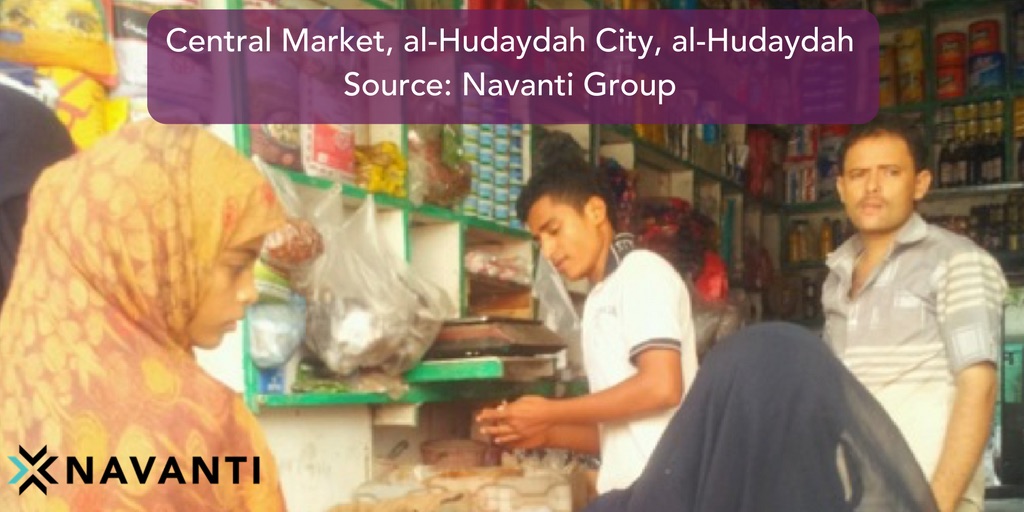The approximately 30% of families that rely on government salaries in Yemen have been affected significantly by the lack of payment of government salaries between August and December 2016. They have been unable to purchase the same quantity or quality of food as previously, are less able to send their children to school or provide for their marriages, and have been forced to look for alternative livelihoods or ask outsiders for help. While just this month, the Republic of Yemen government that controls Yemen’s central bank announced that salaries could begin to be paid again, the effects of the lack of payment could be felt for some time.
The ongoing destruction of war, displacement, and shortages of fuel and electricity in Yemen have separated many families from their livelihoods since March 2015.
The most reliable sources of income across Yemen (including the residents of al-Hudaydah, Yemen, described here) throughout the course of the current conflict have been government salaries and pensions, and they have become even more vital to families as other sources of income have dried up. However, due to the liquidity crisis at the Central Bank of Yemen, most public sector employees and pensioners were not paid for the five months from August to December 2016.
This liquidity crisis was complicated in September 2016 by the move of the location of the Central Bank of Yemen to Aden — away from the Houthi-controlled capital Sana’a. This raised the question of whether funds would be cut off to Houthi-controlled areas.
>
“An activist in Houthi-controlled al-Hudaydah, Yemen told Navanti Group, “salaries and pensions have not been disbursed since August 2016, with the exception of half payments of salaries to some government departments in November 2016.””
In some cases the non-payment of salaries left families without any significant income at all. To explore how households were coping with this major shock, Navanti interviewed five families in al-Hudaydah, Yemen in January 2017.
While this was just before the January 9, 2017 announcement by Prime Minister Ahmad Obeid Bin Dhaghar that government salaries and pensions to all areas of the country could now resume following the receipt of newly printed bank notes, it will still take some weeks before government employees receive what they are owed.

According to the families we interviewed, the most striking impact of the loss of these salaries is on the affected families’ access to adequate quantities of nutritious food. Out of shrinking financial resources, all interviewed families placed food as their top priority for expenditures, followed by education, healthcare, shelter, and fuel. Families have had to make decisions on cutting out purchases of meat, milk, and sometimes fruits and vegetables in order to afford any food at all from a dwindling budget, relying mainly on cheaper staples such as bread and rice that lack protein and necessary vitamins and minerals. When families can purchase food, it is generally in smaller quantities than prior to August 2016.
While some families are still able to borrow funds to buy food, others now find themselves turned away from credit by shopkeepers after they can no longer demonstrate a steady salary as proof that they will be able to repay loans. This has left humanitarian aid and the kindness of strangers as their only source of food.
>
“As a 30-year-old male government employee explained, “most shopkeepers and traders stopped offering credit for food, fearing that they would not be repaid. Now we have to borrow money from family and neighbors. We also get food by humanitarian aid from merchants and businessmen.”
Those families that have been able to develop alternative sources of income to make up for the shortfall in salaries and pensions have fared the best. In the midst of a civil war, one of the easiest income opportunities to turn to has been entering sales in the informal economy.
>
“Now I sell sweets from a small cart,” said one male teacher, age 30. Another teacher described how he, “resorted to selling qat in the market because we live in tragedy after salary payments stopped.”

Meanwhile, other families have not been so lucky, and the next generation is paying the price in lost educational and marriage opportunities.
As one 27-year-old housewife related, “our situation is getting worse because we depended on the government salary in a big way. Our children cannot reliably go to school every day because we can’t pay for transportation. The owner of the house is about to kick us out of the house because of non-payment of rent.”
Additionally, a 55-year-old teacher lamented, “I have a 28-year-old son who wants to get married, but he is out of work [because of the war], and now we can’t afford for him to get married. It really affects me that I can’t support my family as I did before.”
It remains to be seen whether salaries and pensions will be disbursed again as promised to provide affected families much-needed relief.
An al-Hudaydah-based activist recently told Navanti Group there are still people waiting hopefully at the city’s post office to collect what they are owed…
About Navanti
Navanti researches socio-economic and political risk trends using a combination of in-house subject matter experts and hyper-local atmospherics reporting from local researchers in predominantly high-conflict zones across Africa, the Middle East, and Eurasia.
About the Author
Haley Cook-Simmons is a Middle East and Africa-focused analyst at Navanti Group. Navanti researches socio-economic and political risk trends using a combination of in-house subject matter experts and hyper-local atmospherics reporting from local researchers in predominantly high-conflict zones across Africa, the Middle East, and Eurasia.

